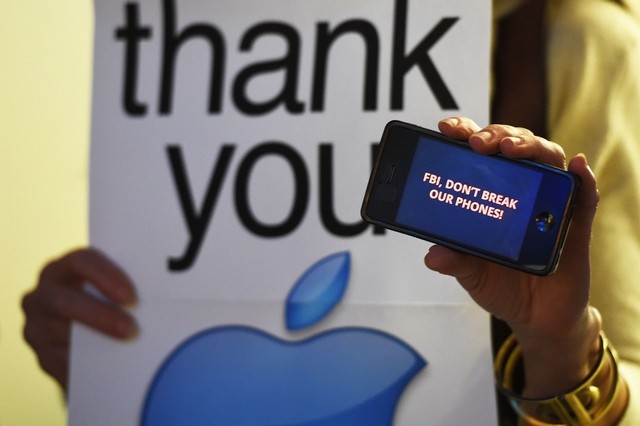
Protesters demonstrate outside an Apple Store as they object to the US government’s attempt to put a backdoor to hack into the Apple iPhone. Mark Ralston / AFP Photo
By tomorrow, Apple, one of America’s most valuable brands, will have to explain why it seems unable to distinguish between illegal US government mass surveillance and legitimate law-enforcement activities. Chances are that its arguments will not be startlingly new.
The tech company will probably stress the high-mindedness of its recent refusal to help US federal authorities access the data on the San Bernardino shooter’s phone. It will say that it should not be compelled to write new software that would give the FBI the opportunity to crack the phone password used by the shooter Syed Rizwan Farook. It may repeat its chief executive officer Tim Cook’s contention that writing such software will set a “dangerous precedent”. It may argue, as Mr Cook did, that such a step would create “the equivalent of a master key, capable of opening hundreds of millions of locks”.
In the end, Apple will probably say that its primary duty is to its customers and the privacy of their data. Months before the San Bernardino iPhone stand-off, Apple had refused to help the authorities crack the phone in a routine drug case. At the time, Apple attorney Marc Zwillinger spelt out the line. The company “shouldn’t be in that business [of accessing customers’ data], either on our own or being conscripted by law enforcement,” he said. Conscripted is an interesting word for a tech company to use. It suggests that Apple believes this is a war between the people and their government. That it rejects being drafted in to help the government wage this war. And that this is on a point of principle.
Is Apple right? It clearly feels it is on firm ground, especially in the court of public opinion. Former US National Security Agency contractor Edward Snowden’s 2013 revelations of mass surveillance programmes run by the NSA and British intelligence agency GCHQ have set off an international debate about the balance between security and privacy.
Everyone with a mobile phone and everyone who uses the internet can be said to have a legitimate stake in this argument. That adds up to a lot of people worldwide. In 2014, the United Nations’ telecommunications agency said there were almost as many mobile phone subscriptions (6.8 billion) as there are people on Earth (7 billion). In 2015, it estimated that more than 3 billion people were using the internet. Clearly, Apple’s apparent defence of mobile phone users and internet surfers taps into a legitimate concern that resonates around the world.
Other big tech companies, liberal politicians and Mr Snowden himself have come out on Apple’s side. The Reform Government Surveillance industry lobby group, which includes Apple, Microsoft, Google, Facebook, Yahoo, Twitter, AOL, LinkedIn, Dropbox and Evernote, has publicly supported Apple’s refusal to help the government. In Barcelona for the Mobile World Conference, Facebook’s Mark Zuckerberg said he was “sympathetic” to Apple’s case, because “we believe in encryption”. Brad Smith, Microsoft president and chief legal officer, tweeted that “in a world where we need to keep both the public safe and privacy rights secure, backdoors [to access users’ information] take us backwards.” Mr Smith’s remarks were retweeted by Microsoft’s CEO, Satya Nadella.
But here’s the flaw in that argument. There is a decided distinction between mass surveillance and law enforcement, especially when the authorities are investigating a crime. In San Bernardino, a married couple bizarrely went on the rampage, leaving their infant daughter at home.
They killed 14 people. The shooters are said to have been influenced by ISIL. It is surely legitimate that the American authorities strive to uncover the killers’ motivations, contacts and support groups, if any.
Interestingly, this point has been made by Microsoft co-founder Bill Gates. Criticising Apple’s refusal to help the government, he described it as “no different than [the question of] should anybody ever have been able to tell the phone company to get information, should anybody be able to get at bank records”.
There’s the rub. Before the internet took off and smartphones arrived in every pocket and Mr Snowden revealed the US government’s illegal technological invasion of individual privacy, there was never any question that criminality should be thoroughly investigated and properly prosecuted. In almost every jurisdiction in the world, police have always asked phone companies to hand over records relevant to a crime case. So have banks, utility companies, estate agents, insurance salesman and doctors. Every entity — individual or corporate — has always been required to assist the police with their inquiries. Why should a technology company be the exception to the rule?
All the signs are already there that ordinary people won’t buy it. A new survey by the Pew Research Center in America found that roughly half of the respondents supported their government’s right to gain access to the contested data on the San Bernardino iPhone.
It seems as if they realise, even if the tech world doesn’t, that mobile telephony and the internet is not an alternative universe.
By conflating the individual’s right to privacy with an insidious government assault on civil liberties, the technology industry risks undermining the basic principles of law and order. This is not about whittling away citizens’ rights by statutory and regulatory measures. It is about investigating a heinous crime.

